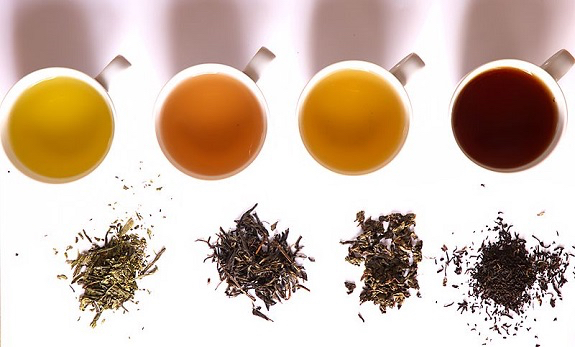Only Certain Fruits & Vegetables May Cause Weight Loss
- At March 01, 2016
- By Katherine
- In Articles, News
 3
3
For the first time, scientists have discovered certain fruits and vegetables – and not others – are associated with preventing weight gain over the course of many years regardless of calories, according to a recent Harvard study published in the British Medical Journal. These fruits and vegetables contain a class of phytonutrients called flavonoids, a plant compound with anti-inflammatory and anti-oxidant properties, among other benefits.
“The particular fruits and vegetables associated with less weight gain are rich sources of several flavonoid subclasses, particularly flavonols, anthocyanins, and flavones. Animal models and short term human studies provide evidence for underlying mechanisms that relate flavonoids to weight: several flavonoid subclasses have been shown to decrease calorie intake, increase blood sugar uptake in muscle in humans, and decrease blood sugar uptake in fat tissue in test tube studies. Other studies, predominantly focusing on green tea, a rich source of the flavan-3-ol subclass of flavonoids, provide evidence to suggest that flavonoids may decrease fat absorption, increase energy expenditure, and inhibit body fat synthesis,” according to the study.
In the study, anthocyaninins, the blue pigment in many fruits and vegetables, were mainly found in blueberries and strawberries, among others. Flavan-3-ols were mainly from tea, apples, pears, and peppers.
So, while it’s important for your health and weight management to eat at least 5 cups of fruits and vegetables daily, you may want to consider adding these very specific fruits and vegetables to your routine. “An Apple A Day…”
Kale! Kale! Everywhere!
Kale and Spinach Gratin with Garlic, Rosemary, and Thyme
(excerpted from Diet Simple Farm to Table Recipes)
Serves 6
1 pound Kale, cleaned and stems removed
2 pounds Spinach, cleaned and stems removed
1 Tablespoon Olive or Canola Oil
1 Large Garlic Clove, minced
2 teaspoons fresh Rosemary, chopped (or 1 tsp dry)
1 teaspoon fresh Thyme leaves, chopped (or ½ tsp dry)
1 recipe Olive Oil Bechamel Sauce (see recipe)
Salt and Freshly Ground Pepper to taste
¼ Cup Parmesan or Gruyere Cheese, freshly grated
Preheat oven to 400 degrees F. Wash the Kale and Spinach and remove the tough stems. Chop roughly. Heat the oil in a large iron skillet over medium-low heat. Add the garlic and cook until it just begins to color. Add the greens, the rosemary, and thyme to the pan, and let cook a couple of more minutes while stirring until the greens are wilted.
Stir the Bechamel sauce into the greens. Add salt and pepper. Pour into an oiled 2-quart soufflé or heat resistant glass dish and sprinkle the cheese on top. Bake at 400 degrees F for 20 to 30 minutes, or until the top is just beginning to brown.
Olive Oil Bechamel Sauce
This is a classic French white sauce, but using healthy olive oil instead of butter.
Makes 2.5 cups
3 Cups 1% Milk
2 Tablespoons Olive Oil
2 Tablespoons Flour
Salt and Ground Pepper to taste
Pinch of grated nutmeg (optional)
Simmer the milk in a saucepan on medium-low heat. Meanwhile, heat the olive oil in a heavy skillet. Add a bit of flour, and when it sizzles, add the rest. Stir constantly with a wooden spoon or whisk over medium heat. Do not brown. Whisk in the hot milk. Return the mixture to the heat, stirring until the sauce thickens. Reduce to low making sure it does not burn. Add salt, pepper and nutmeg to taste.
Deep Green Leafy Vegetables have the highest antioxidant content of all vegetables. High in fiber, they are rich in minerals, B-vitamins, beta-carotene, and lutein, a compound which may help reduce the risk of age-related macular degeneration (the leading cause of preventable blindness) and other eye diseases such as cataracts. Absorption of carotenoids, such as lutein, in your body is increased by cooking and by the presence of fat (so cook in a little healthy olive or canola oil!).
Supplement Manufacturers Sued and Arrested for False Claims
- At December 27, 2015
- By Katherine
- In Articles, News
 0
0

The United States Department of Justice brings criminal charges against popular supplement manufacturers
There are a LOT of dietary supplements on the market. They all make lots of claims about what they can do for your body and health – many in particular tend to trumpet their ingredients, especially if they’re “all natural.”
Well, the Department of Justice thinks we can’t trust what the supplements tell us. DOJ brought civil and criminal actions against 117 – yes, you read that correctly, 117 – individuals and entities. Of those, 89 have so far been the subject of cases.
Some are accused of mislabeling because the product has ingredients not listed on the label. Others are charged with making claims about what the supplement can do without adequate supporting scientific evidence. An Assistant Attorney with DOJ said they brought these actions “so consumers know the serious health risks of untested products.”
One particularly bad case is USPlabs LLC, which made both workout and weight loss supplements. DOJ alleges that USPlabs used synthetic stimulants instead of natural plant extracts that they advertised. Further, USPlabs is charged with knowing that one supplement, OxyElite Pro, might cause liver toxicity and secretly selling OxyElite despite telling the FDA it would stop. Because of this, 6 employees have been arrested, and company assets have been seized.
You can read more information about UPSlabs and other companies in their press release. But use this as a warning, and be careful what supplements you buy! You should always do your research on supplements before you add them to your routine – talk to a health professional if you can! At the very least, though, be glad that someone is working toward your best interest.
New Studies on Cocoa: Reduces Wrinkles and Protects Against Alzheimer’s Disease
- At November 29, 2015
- By Katherine
- In Articles, News
 0
0
For most people, chocolate is a delicious treat to enjoy in moderation. Some new scientific work, though, may give you an excuse to treat yourself more often.
The first, a study published in the Journal of Nutrition, examined the effects of cocoa on the moderately sun damaged skin of women aged 43 to 86. The participants drank flavanol-enhanced cocoa drinks, containing 320 mg flavanols** daily, over 24 weeks. It’s been established in previous studies that flavanols in cocoa – and other foods – help maintain a healthy vascular system, relax blood vessels (lowering blood pressure), reduce blood clotting – an aspirin-like affect –reduce oxidative damage, and improve blood flow. This new study found that women who drank the flavanol – fortified cocoa drink (containing the equivalent of about 4 tablespoons of cocoa daily**) experienced reduced wrinkles and increased skin elasticity, thereby reducing the effects of sun damage and aging – probably due mostly to their antioxidant and anti-inflammatory properties.
Cocoa flavanols may impact brain aging, too, according to a recent Journal of Alzheimer’s Disease review. Previous research has shown that flavanols contribute to healthy brain aging and cognitive decline prevention by improving blood flow to the brain and reducing the oxidative and inflammatory damage which occurs with aging. But cocoa harvesting and production produces highly variable levels of flavanols in cocoa products. So scientists are looking for more consistent methods for developing cocoa flavanol formulas containing higher levels of flavanols. “The ultimate goal of this review is to provide recommendations for future developments of cocoa extracts as a therapeutic agent in AD [Alzheimer’s Disease].”
These results could mean big things down the line for brain and skin health! Meanwhile, keep in mind that flavanols are also found in tea, wine and many fruits and vegetables. Also, nutrition studies tend to use concentrated forms of nutrients so the effects are more measurable and significant. Conclusion: eat a plant-based diet!
Read more extensive information on cocoa and its health benefits…
Katherine’s Chocolate for Health Tips:
If you’re eating chocolate for health benefits, you’ll need to be very discriminating in your selections.
You’ll get more flavanols, and therefore health benefits, with less processing. The first choice is cocoa, which isn’t Dutch processed – as when cocoa is “Dutch processed with alkali” the flavanols are reduced. Look for chocolate which has the highest percentage of cocoa as possible and to save calories, look for chocolate with lower fat and sugar levels. In general, cocoa is your best first choice. Second choice is a semisweet or bittersweet chocolate with a high cocoa percentage. Some chocolates go as high as 85% cocoa, but legally can be as low as 35%. I recommend no more than an ounce a day, which may be about 110 – 150 calories, depending on the chocolate. Any more than that and you’re probably going to take in too many calories for weight control
**The numbers:
Type of Chocolate Mg Flavonols Calories
1.3 oz Dark Chocolate Bars, Average*: 82 mg 187
1.3 oz Milk Chocolate Bars, Average*: 42 mg 198
1 TBSP Unsweetened Cocoa Powder, Average*: 75 mg 12
*USDA’s Nutrient Data Laboratory
Tea Has Amazing Health Benefits – Green or Black Tea
- At November 20, 2015
- By Katherine
- In Articles, News
 0
0
Need an excuse to break for afternoon tea at work? A new study found green or black tea, in a very concentrated form, can improve your overall health in many different ways.
As I wrote in my Washington Post article, tea has long been known for its antioxidant and anti-inflammatory properties. So researches decided to extract one of the most active compounds in tea to see what would happen. The extract, called “AssuriTEA,” was given to subjects in different doses. They found all doses had benefits, but most of the benefits were experienced in the subjects with the largest dose. After taking the extract for 28 days, the subjects showed improved antioxidant levels (which protects you from almost all diseases), lower blood glucose levels, and increased energy. They also found lower systolic blood pressure at both dosages and lower diastolic blood pressure at the higher dosage.
Even though we don’t have access to this extract; no matter; I recommend using “whole” tea leaves anyway: The whole food is always better! Studies use concentrated forms of foods so they can more easily measure results. This study, published recently in the journal “Functional Foods in Health and Disease,” confirms the health benefits of tea are impressive – I know what I’m doing at 3 o’clock today! You?
Short Bouts of High Intensity Exercise may be as Effective – or Better Than – Walking
- At November 19, 2015
- By Katherine
- In Articles, News
 0
0
For people with Type 2 Diabetes or anyone trying to lose weight, we all know physical activity is a key part of health management. Walking (low – to – medium intensity exercise) is effective, but takes time to get your 10,000 daily pedometer steps.
So what I’m about to tell you may be good news if you have limited time: A new study, recently published in the journal, Circulation, shows there may be an alternate and effective way to lose weight, lower blood pressure, glucose, and cholesterol. People were divided into two groups; one group did 30 minutes of exercise, five days a week at 65% of their target heart rate, while the other did 10 minutes of exercise, three times a day, 5 days a week at 85% of target heart rate. Those who were assigned to the high intensity group ended up exercising more. They also showed larger improvements in glucose levels, lipid profiles (cholesterol), body weight, and cardiovascular fitness as compared to the lower intensity group.
Were the improvements due to the intensity of the exercise or the fact that the high intensity group ended up exercising more? No matter. This study, and others I’ve seen, show short bursts of high intensity exercise will get the results you need to manage your health, so I recommend it to anyone with limited time, and with the ability to exercise intensely.
But if you have even less time, you may not even have to do 10 minutes.
Researchers at the University of Copenhagen in Denmark found ten seconds works! Their study found that a full ten minutes of high intensity exercise may not be necessary and that most people can’t tolerate that amount of intensity. The Danish study found four 10 second bouts of intense exercise may do the trick. The researchers came up with a formula they called 10-20-30: Start with 30 seconds of regular intensity exercise (bike or walking, etc), increase to 20 seconds of medium intensity, then accelerate to 10 seconds of high intensity exercise, and repeat 4 times. And while their subjects were only exercising for 12 minutes they were achieving significant health results, such as lower blood pressures.
That said, my experience with hundreds of clients over the years, proves walking works! You can lose body fat, lower blood pressure, glucose, and cholesterol by walking – not to mention improve thinking and memory, increase energy levels and self-esteem, reduce arthritis pain, and even improve gastrointestinal health. But, if you don’t have the time or the patience for long stretches of walking, don’t worry, as it seems there are other ways to get results! Bump up your exercise intensity for shorter periods of time through the day.
Bottom line: Just move! If walking is your preferred way, that will get you the results you want. But these studies show short bursts of high intensity exercise may also gets results, and perhaps even better results.
For me: I’ll stick with walking to keep my knees and back happy. Though, occasionally, I’ve included four 10-20-30 intervals while getting my 10,000 daily pedometer steps. It seems to improve my endurance, especially when I drink my cafe latte before exercise!
Strong Legs are Linked to a Stronger Brain
- At November 17, 2015
- By Katherine
- In Articles, News
 0
0
Want to make sure your mind stays sharp later in life? Strengthen your legs to strengthen – even increase – your brain.
Everyone wonders what they can do to stay of sound mind as we age. Well, now we may have a strategy: get strong gams!
Researchers studied twins over a period of 10 years. What they found was promising. Those who had increased leg power at the start of the study showed improved cognitive aging after the 10 years. They also found those with stronger legs had larger gray matter volume.
Because of these findings, published recently (November 10th) in the journal Gerontology, researchers intend to do bigger and longer studies. They even plan to look at how other areas of strength might correlate with improved cognition. While they do that, I’m going to do more squats and lunges…after I take a nice, long walk to make sure I can do crosswords for a long time!
Trying to Lose Weight? Skip the Diet Soda and Go To The Tap!
- At November 13, 2015
- By Katherine
- In Articles, News
 0
0
People trying to lose weight look for any way to cut calories. We tend to consume a lot of calories in liquid form, so people often think diet beverages are a great way to help them lose weight. But researchers have a better (and cheaper!) solution: good old fashioned water.
In a recent American Journal of Clinical Nutrition study, participants on a weight-loss plan were asked to cut out diet drinks in favor of water after lunch over 24 weeks. Compared to those who stuck with diet soda, those who drank H2O saw greater weight loss and better insulin resistance.
Water is cheaper than diet beverages and is great for digestion. So if you’re looking to improve your health and slim down, skip the can and head for the tap! Your stomach will thank you.
Reason? This study I’ve written about shows artificial sweeteners may reduce your ability to burn body fat, but there may be other reasons, too…
Your Weight Affects Arthritis Flare-Ups and Remissions
- At November 11, 2015
- By Katherine
- In Articles, News
 0
0

Your size affects whether rheumatoid arthritis, a painful and debilitating form of arthritis, flares up or goes into remission. A recent study looked at whether Body Mass Index (BMI) – your weight – had any relationship with rates of long-tern remission of early rheumatoid arthritis (ERA). They looked at patients in the normal (BMI 18.5-24.9), overweight (25-29.9), and obese (≥30) ranges.
Results showed that rheumatoid arthritis sufferers who are at healthy weights were able to stay in remission longer than people in the overweight and obese ranges, who were less likely to achieve long-term remission.
What does that all mean? Your body weight (BMI) isn’t the final word in health, but it shows that weight control and management might play a part in rheumatoid arthritis treatment.
Up Your Orange Intake! Doses of Vitamin C Shown to Effectively Eliminate Cancer Cells
- At November 10, 2015
- By Katherine
- In Articles, News
 0
0
Researchers have studied the effects of Vitamin C, most famously found in oranges, for some time, but results have been mixed. Some studies showed success while others did not, though some of the discrepancy may be explained by how the Vitamin C was administered; injections worked while oral consumption did not.
A recently published study builds on these past findings and might explain the results. Researchers found that Vitamin C is most effective in an oxidized form, meaning it has been combined with oxygen. They specifically found that high doses of oxidized Vitamin C killed mutated colorectal cells. The treatment slowed tumor growth in mice and, in one result, “dramatically changed” the metabolic profile of the mutated cells within just one hour of treatment.
The most exciting part, though? Oxidized Vitamin C has “selective toxicity”, meaning the treatments killed off cancer cells without harming normal cells.
The study was done on mice, so future steps would have to include human testing to make sure the results carry over, but the outcomes are promising and would be a major breakthrough in cancer treatment. Regardless, I’m using these findings as an excuse to add more delicious oranges to my diet!
co-authored by Nik Nartowicz








![oranges[1]](https://katherinetallmadge.com/wp-content/uploads/2015/11/oranges1.jpg)








